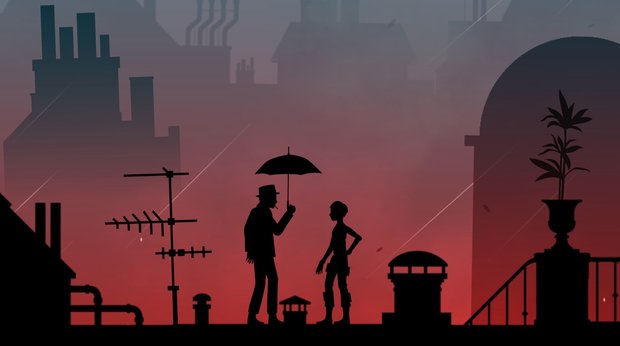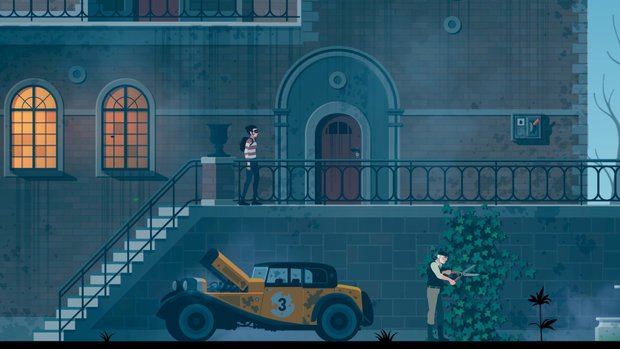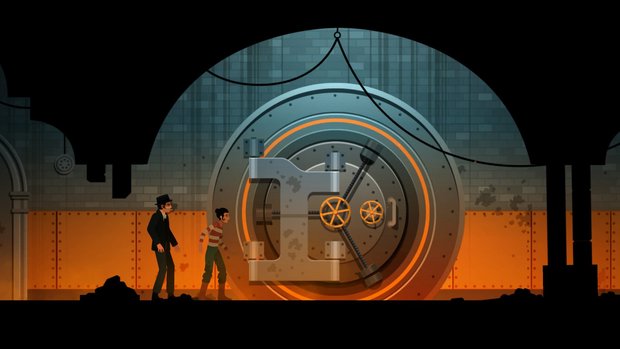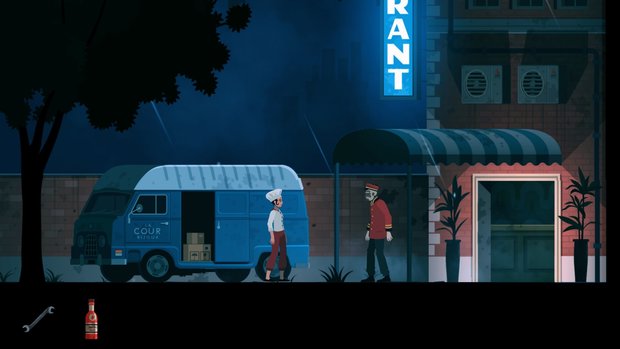Midnight Girl review

- 1 Comment
Slick if somewhat repetitive side-scrolling heist adventure with a pinch of 60s Parisian cool
Paris in the ’60s: a city of mellow jazz, bustling cafes, sparkling cabaret and, just occasionally, high-stakes robberies. Midnight Girl, the maiden outing by Danish indie studio Italic, is a languid tribute to classic cinema and cool heist movies. There's a fabulous diamond, a young but feisty cat burglar and her infamous mentor, and locations both sunnily exotic and darkly dank. Its sharp graphic art and moody ambient score ooze style, though the mundane (if intricate) puzzles and simply drawn characters never quite spark the imagination. It may not linger for long in the memory, but it's an entertaining diversion into the underworld nonetheless.
You play as Monique, a teenager who drifted into thievery after her mother died and her father left to make his fortune in Chile. He perpetually claims he's about to make it big and start sending money home any day now, but in the meantime Monique's had to get by any way she can. Right now she has a charming apartment, a chair on the roof from which to admire the Paris skyline over her morning coffee, and several months' back rent to pay. That’s okay, though, as she has a plan to fix all that by stealing a chalice valuable enough to not only clear her debts but also let her fly out to find her father in South America. If only she can dodge past her jazz-hating landlord and make it to her car.
Naturally, like all best-laid plans, this one doesn't quite work out. But on the upside, jail isn't quite the dead end you might expect. Instead, it just happens to be the temporary abode of the (in)famous Night Owl, cat burglar supreme and one of Monique's heroes. Before you can say "Mon Dieu!" the pair are back at large with their eyes set on an even bigger prize: the Luxembourg diamond. Yes, it's hidden in a dauntingly secure vault, deep beneath Paris behind the best security money can buy, but Night Owl has some ideas for dealing with that. Ideas that take them to a remote island nunnery, behind the scenes at the Paris Metro, and on down into some super creepy catacombs. Along the way they'll have to sneak past guards, impersonate staff, and pick more than a few locks. And deal with being betrayed by old allies, so maybe there really isn’t honour among thieves after all?

Midnight Girl makes a striking first impression. Inspired by Belgian comics, the graphics blend clean, straight lines and smooth gradients to create an aesthetic that's dramatically graphic, in a mid-century modern kind of way. Such a heavily stylised look could be clinical and cold, but an abundance of small animations such as fans spinning, candles flickering and motes of dust in the air help to add character and warmth. The scenes are viewed straight-on in 2D and usually span several levels, scrolling as you head upstairs or move sideways from room to room. With such expansive areas and minimal scene transitions, each building has the feel of an open dollhouse.
The soundtrack, by contrast, is understated to the point of being more mood than score. Apart from the occasional mournful trumpet riff, it's generally content to be an ambient thrum in the background, letting the hiss of steam, patter of rain, or whirr of air conditioning create the atmosphere. I was initially hoping for some laid-back cafe jazz, but after spending more time in the game's world, this is probably a better fit for the vintage movie vibe the developers are going for. There's no voice work, with the sparse dialogue instead appearing across the top of the screen.
The story is spread over twelve chapters, each taking around twenty to thirty minutes to complete. That last point is worth noting, as there's no way to save your progress within a chapter. Instead, quitting resets you to the start of the current chapter, strongly encouraging you to finish it before calling it a day. Like a book or movie, the chapters are all given titles, such as "The Coup" or "A Dead End?" You can go back and replay earlier ones any time you like, though the linear story limits the benefit of doing so.

As the plot progresses, you move from one self-contained area to another, each with a clear goal that requires solving a tightly linked series of puzzles to achieve. Although most of the areas are fairly compact, they're densely connected and you rarely stay in the same place for long, meaning I sometimes got a little turned around. For example, the mansion you break into to steal the chalice is spread over four floors with up to four rooms each, with enough going on in them that I kept solving puzzles and acquiring new objects only to wind up wandering around aimlessly, trying to remember where the kitchen (or study, or laser-secured vault) was to use them. Admittedly, I'm a bit geographically challenged at the best of times, and it didn't actually take long to stumble across my destination, but I'd really have appreciated the set of blueprints all well-prepared cat burglars tend to take with them on a job!
The interface is a clean and straightforward point-and-click affair. Nearby hotspots are indicated by icons you can click on to either look at or interact with them, and using an acquired object is a matter of clicking on it in your inventory (at the bottom of the screen) and then on one of the new target hotspots that helpfully appear around you. Since these only pop up in places where the item will actually do something interesting, and there's no way to combine objects, you don't have to worry about tediously trying everything with everything if you get stuck. The hotspot icons stay visible as long as you're within arm's reach, so they're also hard to miss. (That does mean I developed a habit of walking fully from side to side across each screen, just to be sure.)
All this makes playing Midnight Girl a pleasantly frustration-free experience. If anything, too much so: I rarely needed to stop and think for long. On the face of it, the puzzles form nicely intricate chains, but each step is so clear and logical that you're soon rushing from spot to spot thinking, "Okay, once I've got that, I can open this and run along here..." It helps that you keep running into variations on the same problem: interesting items can't quite be seen in the dark, machines and doors need power, and locks need to be picked with the right gadget. You'll find yourself washing multiple uniform disguises and scrounging up several cups of coffee and wine (I'm not sure what that says about gender roles in the ’60s!), but you’ll also tune a couple of pianos and find different ways to feed the piranhas. You’ll (very occasionally) have to get stealthy and evade a guard or two, but you’re given plenty of time to find shady doorways or convenient laundry hampers to hide in and are quickly reset for another go if you fail.

While the game’s relative ease may be disappointing if you're looking to get your teeth into a challenge, it does lend Midnight Girl a pace and energy that's rare in an adventure: there's a rush in literally running around, solving puzzle after puzzle and barreling headlong into what comes next. And in such a lighthearted heist caper, it's probably a good move not to leave players wandering around, stumped and inching their way toward a solution. But I'd still have liked something a little more meaty to chew on, even if it was only a lockpicking minigame, a safe code or two to crack, or finding ways to convince staff that you really do work here. (As it is, wearing the right uniform does the trick every time, no matter how gormless you otherwise appear.)
Unfortunately, the story also drags quite badly during the middle third of the game, which you spend exploring abandoned tunnels of various sorts under Paris. Aside from raising some curious questions (like, what are these coffins and bodies with steampunk prosthetics doing down here?), this feels lonely, unglamorous, and just not very heist-like. You go from tricking your way past people, impersonating them, and deactivating laser barriers to wandering around in gumboots cutting padlocks with a bolt cutter, fiddling with valves and fuses, and trying not to drown as all that fiddling comes back to bite you. I felt like a maintenance worker (and, okay, just occasionally a bit like Indiana Jones), not a thief or con artist.
That's the main issue with Midnight Girl: for a protagonist whose life is supposed to be filled with danger and excitement, all too often the reality is quite humdrum. Logical, reasonable, and sensible, yes, but where are the heart-pounding chases, the witty repartee at the high-stakes table, or any of the other heist movie staples? Likewise, most of the other characters pop up just long enough to assist with a puzzle or two before Monique moves on. There's plenty of breadth and moments of humour, as you encounter a cast ranging from pious nuns to a flamboyant gallery owner, a grumpy handyman, and a thriller-obsessed maid, but there’s little depth as none of them have the time to grow past these simple stereotypes and your conversations tend to be short and to the point.
Only your partner Gustave (the Night Owl) and his nemesis Odile leave much of an impression, thanks to longer interactions during cutscenes. Even then the characterisation isn't exactly deep or detailed: we find out Gustave is starting to feel old and lonely, keen to show he’s still got it, and (at least initially) inclined to treat Monique like the hired help, but that’s about it. Throw in a few plot twists and a dash of double crossing and it’s still a good time, but the plot and characterisation, unlike the graphics, feel more serviceable than inspired.
Final Verdict
Midnight Girl aims for the cool suavity and effortless panache of a vintage heist movie, but can't quite maintain its momentum in such a rarefied atmosphere. On the upside, it absolutely nails the aesthetic, with a crisp, clean graphic novel-style look and a laid-back ambient soundscape, and there's a satisfying intricacy to its puzzle sequences. It's just a pity that many of the individual steps are familiar and often recycled, and that the (admittedly varied) cast is so one-dimensional. Even if it doesn't leave a lasting impression, however, its sheer visual flair and gameplay energy will draw you in, so playing it could be just the right plan if you’re looking for a little breezy escapism.
Hot take
Midnight Girl looks and sounds like a slice of ’60s cool, drawing you into its atmospheric world and keeping you moving. Your life as a burglar doesn’t always match the glamour of the movies, but it's still a lively if all too brief escape.
Pros
- Delightful, clean graphic art style and atmospheric soundscape
- Long and nicely involved puzzle sequences
- Moves along at a good clip
Cons
- Puzzle solutions are often straightforward and repeat ideas
- Can only save between chapters
- Fairly short
Peter played Midnight Girl on PC using a review code provided by the game's publisher.









1 Comment
Want to join the discussion? Leave a comment as guest, sign in or register in our forums.
Bummer, only saving between chapters is a deal killer for me... Might've tried this one out otherwise.
Reply
Leave a comment